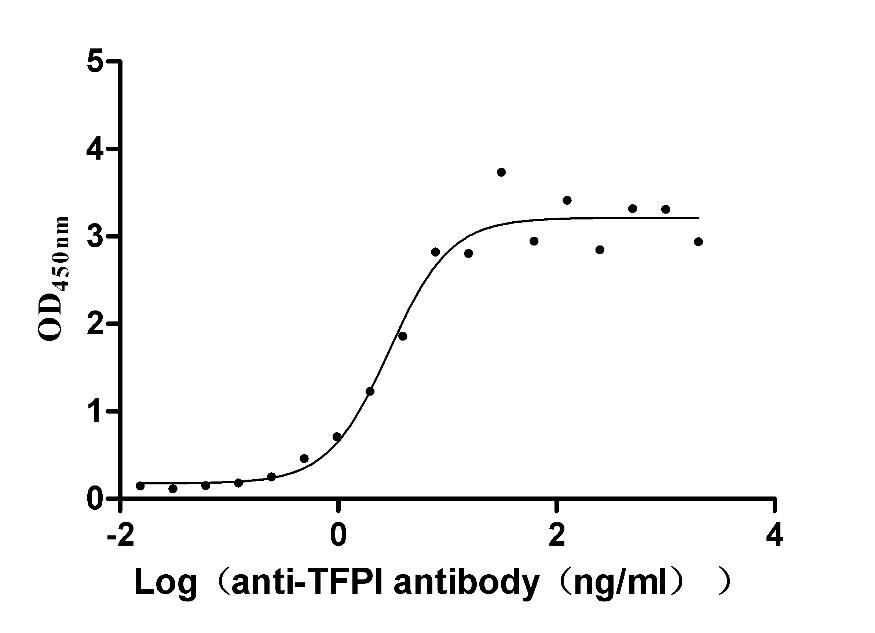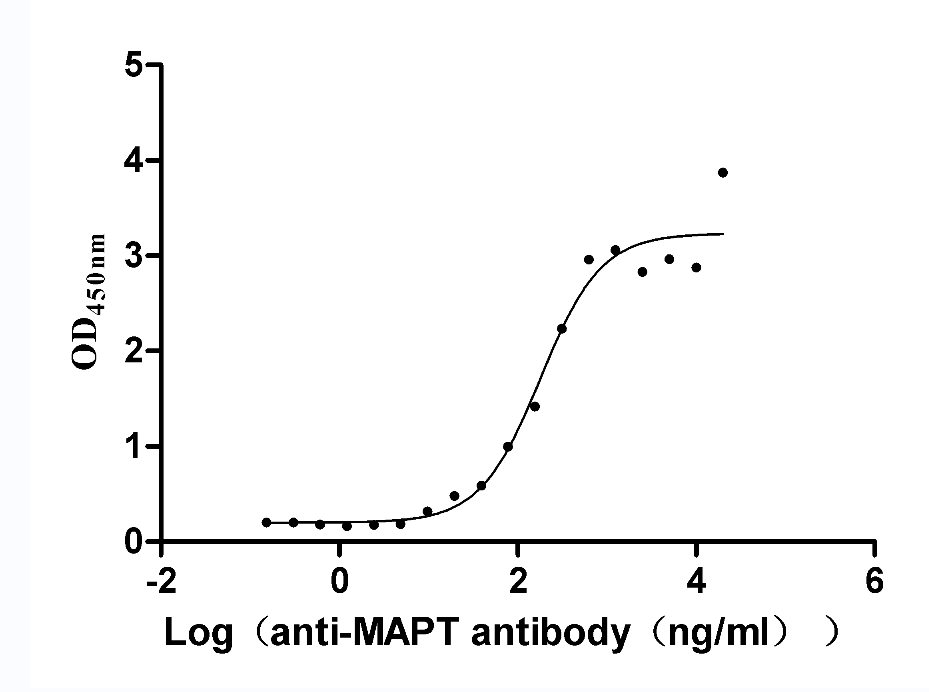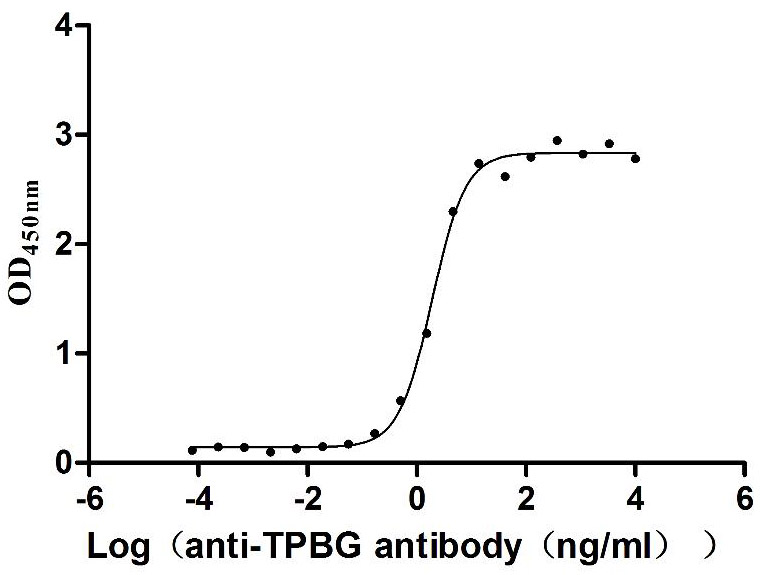Recombinant Human PH domain leucine-rich repeat-containing protein phosphatase 2 (PHLPP2), partial
-
中文名稱:人PHLPP2重組蛋白
-
貨號:CSB-YP754577HU
-
規(guī)格:
-
來源:Yeast
-
其他:
-
中文名稱:人PHLPP2重組蛋白
-
貨號:CSB-EP754577HU
-
規(guī)格:
-
來源:E.coli
-
其他:
-
中文名稱:人PHLPP2重組蛋白
-
貨號:CSB-EP754577HU-B
-
規(guī)格:
-
來源:E.coli
-
共軛:Avi-tag Biotinylated
E. coli biotin ligase (BirA) is highly specific in covalently attaching biotin to the 15 amino acid AviTag peptide. This recombinant protein was biotinylated in vivo by AviTag-BirA technology, which method is BriA catalyzes amide linkage between the biotin and the specific lysine of the AviTag.
-
其他:
-
中文名稱:人PHLPP2重組蛋白
-
貨號:CSB-BP754577HU
-
規(guī)格:
-
來源:Baculovirus
-
其他:
-
中文名稱:人PHLPP2重組蛋白
-
貨號:CSB-MP754577HU
-
規(guī)格:
-
來源:Mammalian cell
-
其他:
產(chǎn)品詳情
-
純度:>85% (SDS-PAGE)
-
基因名:
-
Uniprot No.:
-
別名:KIAA0931; PH domain and leucine rich repeat protein phosphatase 2; PH domain leucine rich repeat protein phosphatase like ; PH domain leucine-rich repeat-containing protein phosphatase 2; PH domain leucine-rich repeat-containing protein phosphatase-like; PHLP2_HUMAN; PHLPP like; PHLPP-like; Phlpp2; PHLPPL
-
種屬:Homo sapiens (Human)
-
蛋白長度:Partial
-
蛋白標(biāo)簽:Tag?type?will?be?determined?during?the?manufacturing?process.
The tag type will be determined during production process. If you have specified tag type, please tell us and we will develop the specified tag preferentially. -
產(chǎn)品提供形式:Lyophilized powder
Note: We will preferentially ship the format that we have in stock, however, if you have any special requirement for the format, please remark your requirement when placing the order, we will prepare according to your demand. -
復(fù)溶:We recommend that this vial be briefly centrifuged prior to opening to bring the contents to the bottom. Please reconstitute protein in deionized sterile water to a concentration of 0.1-1.0 mg/mL.We recommend to add 5-50% of glycerol (final concentration) and aliquot for long-term storage at -20℃/-80℃. Our default final concentration of glycerol is 50%. Customers could use it as reference.
-
儲存條件:Store at -20°C/-80°C upon receipt, aliquoting is necessary for mutiple use. Avoid repeated freeze-thaw cycles.
-
保質(zhì)期:The shelf life is related to many factors, storage state, buffer ingredients, storage temperature and the stability of the protein itself.
Generally, the shelf life of liquid form is 6 months at -20°C/-80°C. The shelf life of lyophilized form is 12 months at -20°C/-80°C. -
貨期:Delivery time may differ from different purchasing way or location, please kindly consult your local distributors for specific delivery time.Note: All of our proteins are default shipped with normal blue ice packs, if you request to ship with dry ice, please communicate with us in advance and extra fees will be charged.
-
注意事項:Repeated freezing and thawing is not recommended. Store working aliquots at 4°C for up to one week.
-
Datasheet :Please contact us to get it.
靶點詳情
-
功能:Protein phosphatase involved in regulation of Akt and PKC signaling. Mediates dephosphorylation in the C-terminal domain hydrophobic motif of members of the AGC Ser/Thr protein kinase family; specifically acts on 'Ser-473' of AKT1, 'Ser-660' of PRKCB isoform beta-II and 'Ser-657' of PRKCA. Akt regulates the balance between cell survival and apoptosis through a cascade that primarily alters the function of transcription factors that regulate pro- and antiapoptotic genes. Dephosphorylation of 'Ser-473' of Akt triggers apoptosis and decreases cell proliferation. Also controls the phosphorylation of AKT3. Dephosphorylates STK4 on 'Thr-387' leading to STK4 activation and apoptosis. Dephosphorylates RPS6KB1 and is involved in regulation of cap-dependent translation. Inhibits cancer cell proliferation and may act as a tumor suppressor. Dephosphorylation of PRKCA and PRKCB leads to their destabilization and degradation. Dephosphorylates RAF1 inhibiting its kinase activity.
-
基因功能參考文獻:
- DualLuciferase activity assay demonstrated that the tumor suppressor PH domain and leucine rich repeat protein phosphatase 2 (PHLPP2) was a target of miR125b, which inhibited PHLPP2 and directly bound to the 3'untranslated region of PHLPP2, resulting in elevated Akt signaling. PMID: 30226579
- MiR-141-3p targets PHLPP2 at its 3'-untranslated region. PMID: 29738771
- miR135a may protect human umbilical vein endothelial cell from mechanical stretch - induced injury by inhibiting PHLPP2 to activate PI3k/Akt signaling pathway. PMID: 30045018
- TMCO1 recruited the PH domain and leucine-rich repeat protein phosphatase 2 (PHLPP2) to dephosphorylate pAKT1(serine 473) (S473). Mutagenesis at S60 of the TMCO1 protein released TMCO1-induced cell-cycle arrest and restored the AKT pathway in BFTC905 cells. Stable TMCO1 (wild-type) overexpression suppressed, whereas T33A and S60A mutants recovered, tumor size in xenograft mice. PMID: 28972042
- Cheliensisin A (Chel A)treatment led to PH domain and Leucine rich repeat Protein Phosphatases (PHLPP2) protein degradation and subsequently increased in c-Jun phosphorylation, which could be attenuated by inhibition of autophagy mediated by Beclin 1. PMID: 27556506
- Results show that MiR-27a directly targets PHLPP2 by binding to its 3'-UTR to inhibit its expression, and that downregulation of PHLPP2 could rescue the effect of anti-miR-27a in gastric cancer cells. PMID: 28327189
- miR-938 promoted CRC cell proliferation by inhibiting PHLPP2 PMID: 28433657
- two PHLPP isozymes, PHLPP1 and PHLPP2, were identified in a search for phosphatases that dephosphorylate Akt, and thus suppress growth factor signaling. PMID: 27913677
- results identify a novel role of PHLPP in regulating aPKC and cell polarity. PMID: 27760826
- Low PHLPP2 expression is associated with luminal breast cancer. PMID: 28224609
- miR-3117 contributes to the proliferation of HepG2 by targeting PHLPPL. PMID: 27822662
- Overexpression of PHLPP2 without its 3'UTR attenuated the effects of miR-181a on cell proliferation and apoptosis in keloid fibroblast cells. PMID: 27915346
- Suggest that direct PHLPP2 downregulation is required for miR-32-induced cell proliferation of breast cancer cells. PMID: 26276160
- Our studies not only first time identify PHLPP2 downregulation by lung carcinogen B[a]P/B[a]PDE, but also elucidate a novel molecular mechanisms underlying lung inflammation and carcinogenesis upon B[a]P/B[a]PDE exposure. PMID: 25977341
- Results showed that PHLPP1 and PHLPP2 gene expression are down-regulated in esophageal squamous cell carcinoma. Their promotor is a target for mir-224. PMID: 26245343
- Aberrant expression of PHLPP1 and PHLPP2 correlates with poor prognosis in patients with hypopharyngeal squamous cell carcinoma PMID: 25793736
- miR-135a promotes cell proliferation in bladder cancer by targeting PHLPP2 and FOXO1, and is performed as an onco- PMID: 25888950
- Data show that miR-372 modulated the expression of phosphoprotein phosphatase PHLPP2 by directly targeting its 3'-untranslated region (3'-UTR) and that miR-372 expression was inversely correlated with PHLPP2 expression in glioma samples. PMID: 25160587
- Results reveal PHLPP2 as a new biomarker of cancer progression, and implicate it as major negative regulator of NF-kappaB signaling. PMID: 24553260
- miR-141 and its targets PHLPP1 and PHLPP2 play critical roles in NSCLC tumorigenesis PMID: 24945731
- biochemical characterization of phosphatase domain of PHLPP1 and PHLPP2;PHLPP1 and PHLPP2 have similar in vitro activities and respond comparably to the presence of metallic ions; metallic ions affect structural stability of the domain;identified 3 residues likely involved in metal coordination and 2 that may be important for structural integrity PMID: 24892992
- This study reveals functional and mechanistic links between miRNA-224 and the tumor suppressors PHLPP1 and PHLPP2 in the pathogenesis of colorectal cancer PMID: 23846336
- IGF-1 may exert its proliferative effects by negatively regulating the PTEN/PHLPP2 signaling pathway in CM cells. PMID: 23715723
- Low PHLPP2 expression is associated with malignant phenotypes in non-small cell lung cancer. PMID: 23856247
- Diacylglycerol signaling limits Akt activation through diacylglycerol kinase delta and PHLPP2. PMID: 23184957
- PHLPP1 and PHLPP2 have an effect on retinal rod CNG channel sensitivity. PMID: 22183406
- Knockdown of PHLPP1 or PHLPP2 resulted in an increase in S6K1 phosphorylation. PMID: 21986499
- The PHLPP2 dephosphorylate Mst1 on the T387 inhibitory site, which activate Mst1 and its downstream effectors p38 and JNK to induce apoptosis. PMID: 20513427
- A functional polymorphism that impairs the activity of PHLPP2 and correlates with elevated Akt phosphorylation and increased PKC levels, was identified. PMID: 19324870
顯示更多
收起更多
-
亞細胞定位:Cytoplasm. Membrane; Peripheral membrane protein. Nucleus. Note=In colorectal cancer tissue, expression is concentrated in the cytoplasm and nucleus.
-
組織特異性:In colorectal cancer tissue, expression is highest in the surface epithelium of normal colonic mucosa adjacent to the cancer tissue but is largely excluded from the crypt bases. Expression is lost or significantly decreased in 80% of tested tumors (at pro
-
數(shù)據(jù)庫鏈接:
Most popular with customers
-
Recombinant Human Tumor necrosis factor ligand superfamily member 13B (TNFSF13B), partial (Active)
Express system: Mammalian cell
Species: Homo sapiens (Human)
-
Recombinant Human Tumor necrosis factor ligand superfamily member 18 (TNFSF18), partial (Active)
Express system: Mammalian cell
Species: Homo sapiens (Human)
-
Recombinant Human 5'-nucleotidase (NT5E) (Active)
Express system: Mammalian cell
Species: Homo sapiens (Human)
-
Recombinant Human Tumor necrosis factor receptor superfamily member 9 (TNFRSF9), partial (Active)
Express system: Mammalian cell
Species: Homo sapiens (Human)
-
Recombinant Rabbit Tissue factor pathway inhibitor (TFPI) (Active)
Express system: Mammalian cell
Species: Oryctolagus cuniculus (Rabbit)
-
Recombinant Rat Microtubule-associated protein tau (Mapt) (Active)
Express system: Mammalian cell
Species: Rattus norvegicus (Rat)
-
Recombinant Macaca fascicularis Trophoblast glycoprotein (TPBG), partial (Active)
Express system: Mammalian cell
Species: Macaca fascicularis (Crab-eating macaque) (Cynomolgus monkey)
-
Recombinant Human CD81 antigen (CD81), partial (Active)
Express system: Mammalian cell
Species: Homo sapiens (Human)


















